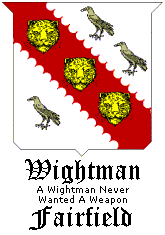The name comes from Eugene Fairfield MacPike. Entrepreneur, free spirit, geneologist, all around cool dude--and my maternal great-grandfather. There are some pictures at right.
But why not Wightman?
In 1997 I was advised by a professional author, David W____, that I didn't want to publish with the last name "Wightman," because that would put me at ankle level in bookstores. To sell you must be seen. I adopted this advice, even though I didn't have an actual novel to put on shelves until the 2010s, by which time most books were being sold online, where shelf level doesn't matter. Name uniqueness does, however: search on Amazon for Eugene Fairfield and you will mostly turn up my great-grandfather.
What's With the Coat of Arms?
The coat of arms is popularly accepted as the arms of the Wightman family in America. According to Mary Ross Whitman, it was granted to William Wightman of Harrow-on-the-Hill on 14 July 1562. As William of Harrow-on-the-Hill is not an ancestor of George Wightman of Quidnesset (the ancestor of most American Wightmans, including myself), it is not correct for me to bear it into battle. Moreover, it isn't even the ancestral Wightman arms, as two other, older arms exist. However, it is the coolest of the bunch, and, as I say, popularly accepted, and since I have no real right to any of the three, and, moreover, no intention of bearing it into battle, I'm using this one.
All right, so what about the motto?
The motto is indeed the family motto, although it is not correctly displayed under this coat of arms, but rather the oldest. I like it because it is something of a double-entendre. "Want" could mean "desire" or "lack." That we never desire a weapon speaks to a peace-loving nature. That we never lack one suggests the power of words over weapons.
Why do you call what you do "Speculative Fiction?"
Speculative Fiction can be either a general term, embracing all of science fiction and fantasy and their sub-genres, or it can be a specific sub-genre angled more on human beings in situations rather than swords and rockets--or nanotechs and ley lines, either, for that matter. Thus it seems to represent my stories well, in both the restricted and non-restricted senses.
Gee, Brian, that sounds like a lot of horse-hockey.
What I mean is when I write I posit an unusual situation, and then ask myself what would happen to the people in that situation. "Nocturne's Bride" is a fine example, in which the story is not about coping with a world in darkness half the year. The story is about the people, and the world reflects on them and what they do. Then there are the times when I don't bother with that and just write a fun story, regardless of genre.
I see you won an award from L. Ron Hubbard. Are you a Scientologist?
No. I look on Writers of the Future as being a charity for new writers. Like the homeless man who spends the night at a Catholic Charities homeless shelter--who could be Catholic, Jewish, agnostic, or nihilist--one's religious beliefs are not a factor in the awards. Of course, you do have to sit through the sermon if you win... but if you can survive that, all is well.
